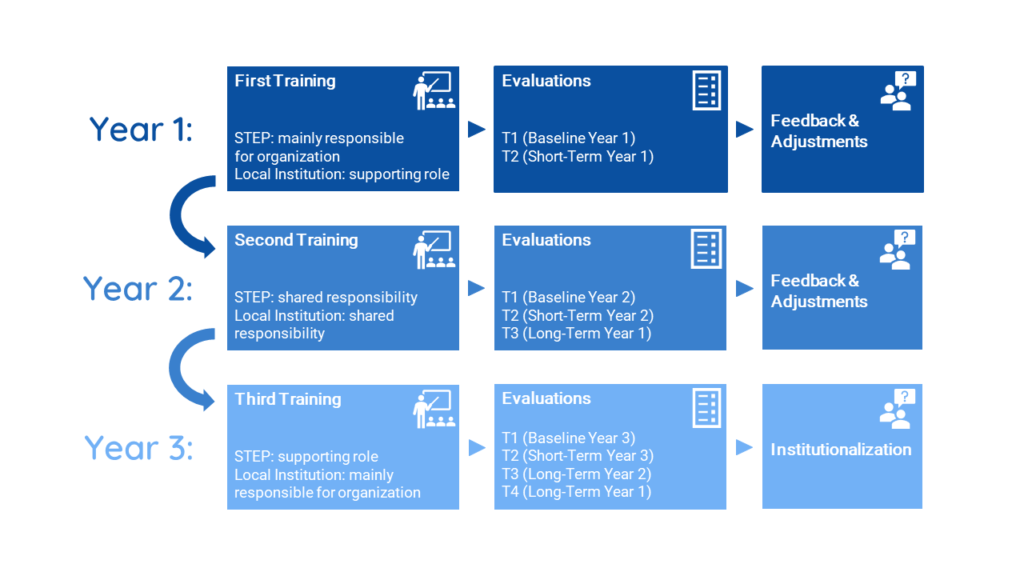What STEP is About
STEP is an entrepreneurship training for youths and young adults. STEP develops young people’s skills, knowledge, and confidence to pursue an entrepreneurial career. In the 12-week training, the students learn step-by-step to start their own businesses. This provides them with an effective means of creating jobs for themselves and other people in the community.
During the course, the students meet weekly to learn action principles about 12 topics important to succeed in entrepreneurship. The weekly sessions are facilitated by local lecturers and cover the domains of business administration, entrepreneurship, and psychology in an interdisciplinary approach:
- Identifying Business Opportunities
- Leadership & Strategic Management
- Financial Management
- Acquiring Starting Capital
- Accounting
- Business Planning
- Marketing
- Action Planning
- Persuasion & Negotiation
- Networking
- Personal Initiative
- Legal & Regulatory Issues
STEP creates entrepreneurs
Percentage of business owners among training group
STEP creates job opportunities
Number of jobs created per participant in training group
The Importance of STEP

STEP provides an answer to adverse labor market conditions and limited employment opportunities. STEP students learn to create their own jobs by starting and running a business. A key benefit is that the students learn to take charge of their professional future. Through the training, the students become more proactive and independent, which supports them in overcoming the extreme unemployment rates among youths and the challenging job market conditions they are facing. Unemployment and poverty are inextricably intertwined. This is the point where STEP seeks to make a difference.
The approach by STEP is supported by researchers and politicians alike. Politicians and researchers ranked fostering entrepreneurship among the top priorities of their agendas to alleviate poverty. Entrepreneurship is a main driver of economic development and wealth creation. Entrepreneurs have the potential to boost the economy and contribute substantially to new job creation. Against this background, entrepreneurship training, such as STEP, is a main leverage for a successful bottom-up strategy to increase the number of entrepreneurs and accomplish politicians’ agenda.
How Everything Started
The STEP project was founded in 2006 by Prof. Dr. Michael Frese and his team from Leuphana University of Lüneburg in cooperation with Makerere University Business School and Uganda Christian University (Uganda).
The first training was conducted in 2009 at Makerere University and Uganda Christian University in Uganda. From these two universities, 200 students formed the first cohort to ever attend a STEP training. The evaluation of the first training showed significant short- and long-term effects on all factors important for entrepreneurship. Based on the positive results, the STEP training was implemented at universities in Liberia, Kenya, Tanzania, and Rwanda. In subsequent years, STEP was extended to further educational institutions, such as vocational training institutes and secondary schools, as well as to further regions, such as South-East Asia (e.g., the Philippines) and Latin America (e.g., Mexico).
Our evaluations in each country have shown that the STEP training has a significant impact on business and job creation. STEP thus contributes to poverty alleviation and job creation on different educational levels and in different regions across the globe.

The Concept
STEP is Action-Oriented
Trainees start their own businesses and are learning by doing.
STEP students form teams and engage in the start-up process of a real micro business during the training. They proceed through the entire entrepreneurial process from preparing to launching and managing a real business. This involves that they identify and evaluate new business opportunities, acquire equipment and raw materials, deal with suppliers, and enter the market to offer their product or service to real customers. The students thus take an active role and learn entrepreneurship „on-the-job“. They experience becoming an entrepreneur under real business conditions. They receive real-life feedback and develop a better understanding of the tasks and challenges of an entrepreneur. This is key to develop a feeling of true mastery of entrepreneurship, a belief of „I can do it“.
STEP is Evidence-Based
The content is based on research on entrepreneurial success factors.
STEP students learn entrepreneurship on the basis of action principles. The STEP action principles have been derived from the scientific literature on entrepreneurship, management, and psychology. They are science-based „rules of thumb“ that provide practical knowledge guiding students what to and how to do it to accomplish the start-up process. STEP is also evidence-based with regard to the didactical approach. STEP is rooted in action regulation theory and the result of our long-standing experience in training and entrepreneurship research in countries with adverse job market conditions and high youth unemployment.
STEP is Scientifically Evaluated
STEP is evaluated according to highest scientific standards and shows positive short- and long-term effects.
Each time we implement STEP at a new institution, we conduct randomized controlled trials (RCT) with a training group and a control group. A comparison of the pre-training measurement with post-training measurements enables us to assess the impact of STEP. In doing this, we can show that STEP enhances students’ intentions to start a business, the confidence in their entrepreneurial skills, their knowledge about how to start a business, and their action planning for starting a new business.
STEP is Locally Embedded
STEP is tailored to local needs and conducted by local trainers.
STEP was developed in cooperation with scholars from Makerere University, Makerere University Business School, Uganda Christian University, and Kyambogo University in Uganda. With every new implementation, the STEP content is adapted to the local context by members of the local institution. The training sessions are conducted by local lecturers who receive a three-day train-the trainer workshop to become certified STEP trainers. The workshops are led by a team of STEP master trainers and in each workshop, up to 12 new STEP trainers are instructed on the methodology of STEP.
The Implementation Process
We developed an effective procedure to facilitate the long-term implementation of STEP at international partner institutions. In a three-year project, the partner institutions are prepared to organize and run STEP, secure the financial resources to sustain STEP, and institutionalize STEP as part of their academic program.
In the first year, STEP is introduced, implemented, and evaluated to demonstrate its beneficial effects on students‘ entrepreneurial behavior.
In the second year, the partner institution assumes responsibility for organizing and implementing STEP. The partner institution also starts securing funding and the administrative procedures to include STEP in the regular curriculum of one or more programs of study.
In the third year, the partner institution independently organizes the training and decides about the institutionalization of STEP in their academic program.



